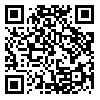

BibTeX | RIS | EndNote | Medlars | ProCite | Reference Manager | RefWorks
Send citation to:
URL: http://imtj.gmu.ac.ir/article-1-1079-en.html

 , Soheila Mohammadi *
, Soheila Mohammadi * 
 2, Seyed Saeed Mazloomi Mahmoudabad1
2, Seyed Saeed Mazloomi Mahmoudabad1 
 , Mohammad Taghi Norbala
, Mohammad Taghi Norbala 

2- Shahid Sadoughi University of Medical Sciences and Health Services , soheila.mohammadi86@yahoo.com
Abstract
Background and Aim: Skin cancer is the most prevalent type of cancers in Yazd city. Childhood and adolescence are important times for preventing the skin cancers.The aim of this study is to survey the effect of education based on protection–motivation theory on skin cancer preventive practices among female high school students in Yazd.
Materials and Methods: This was an experimental study. The participants were 360 female students from four high schools in Yazd city, Iran. They were divided into two groups (180 in case group and 180 in control group). A self–report questionnaire was used to assess the variables, threat appraisal at pretest and follow-up. The questionnaire was distributed before the intervention (pre-test) and following at a two-month interval. T-test, ANOVA , Chi-square, paired t-test , Pearson’s correlation coefficients were used to analyze the data.
Results: There was a significant difference between the mean grade score of all of the variables in case group, in pre-test and follow up phases (p<0.05). No significant difference was seen between mean grade scores of variables in control group in pre-test and follow up phases (p>0.05). A significant difference was found between all the variables mentioned in the case and control groups in follow-up (p<0.05).
Conclusion: The findings support the effectiveness of a PMT- based intervention to change the attitude and behavior associated with skin cancer risk.
Received: 2011/04/4 | Published: 2011/04/15
| Rights and permissions | |
 |
This work is licensed under a Creative Commons Attribution-NonCommercial 4.0 International License. |
